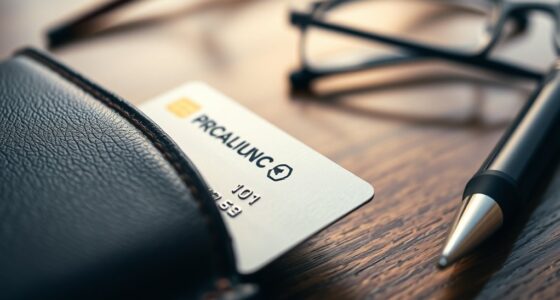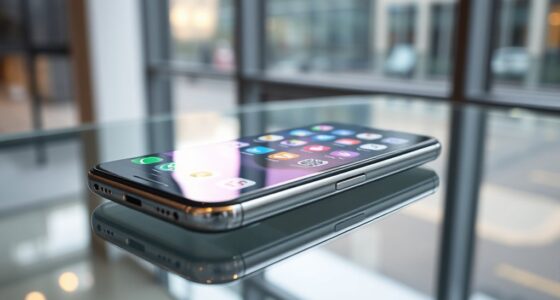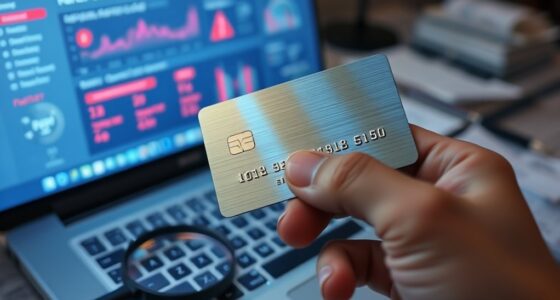On public Wi-Fi, your personal information can be stolen in less than a minute if you’re not careful. Cybercriminals use these networks to intercept unencrypted data, making it easy for them to access passwords, banking details, and emails. Without proper protection like VPNs and updated security settings, you’re vulnerable to identity theft. If you want to stay safe and learn simple ways to protect yourself, keep going—you’ll discover effective strategies to stay secure.
Key Takeaways
- Cybercriminals can access personal data within minutes of connecting to insecure public Wi-Fi networks.
- Lack of encryption on public sites allows hackers to intercept sensitive information rapidly.
- Without VPN protection, your passwords, banking details, and emails are vulnerable almost immediately.
- Unsecured devices and outdated software increase the risk of swift identity theft on public networks.
- Cybercriminals often exploit public Wi-Fi hotspots to steal identities before users realize the breach.

Have you ever connected to a public Wi-Fi network without thinking twice? It’s easy to assume these networks are safe, especially when you’re in a hurry or just trying to get some work done. But the truth is, public Wi-Fi can be a goldmine for cybercriminals looking to steal your personal information. When you log onto these networks, your device becomes a potential target, and without proper precautions, your identity can be compromised in a matter of minutes. That’s why understanding mobile security and encryption methods is vital to protect yourself.
Mobile security involves more than just having a password on your device. It’s about implementing strategies that safeguard your data, especially when connecting to untrusted networks. Many people overlook the importance of security settings or fail to update their software, leaving gaps that hackers can exploit. Using a virtual private network (VPN) is one of the most effective ways to enhance your mobile security. A VPN encrypts the data transmitted between your device and the internet, creating a secure tunnel that makes it extremely difficult for anyone to intercept or decipher your information. When you connect to public Wi-Fi, this encryption acts as a shield, ensuring that sensitive details like passwords, banking information, and personal emails stay private.
Encryption methods are the backbone of secure communication over networks. They convert readable data into coded information, which can only be deciphered with the right key. When a website uses HTTPS, it employs encryption methods such as SSL/TLS protocols, securing your connection and protecting your data from eavesdroppers. However, not all public networks enforce these secure connections, so you should never assume your connection is safe just because it looks legitimate. Always check for the padlock icon in your browser bar and avoid entering sensitive information on websites that don’t use encryption.
Beyond encryption, you should also be aware of other mobile security practices. Turn off sharing features, disable Wi-Fi when not in use, and avoid accessing banking or shopping sites over public networks unless you’re using a VPN. Keep your device’s software up to date, as updates often include security patches that fix vulnerabilities hackers might exploit. Using strong, unique passwords and enabling two-factor authentication adds extra layers of protection, making it even harder for cybercriminals to access your accounts. Additionally, stay informed about Gold IRA Rollovers and other secure investment options to diversify your financial security beyond just digital safety.
In short, your awareness and proactive measures are your best defense against the rapid and ruthless nature of identity theft on public Wi-Fi. Don’t underestimate how quickly your personal information can be compromised—take mobile security seriously and use encryption methods to stay one step ahead of cyber threats.
Frequently Asked Questions
How Can I Tell if My Identity Has Been Stolen?
If you’re wondering how to tell if your identity has been stolen, keep an eye on signs of identity fraud, like unfamiliar charges or accounts. Regularly review your credit reports and bank statements for suspicious activity. If your personal data is compromised, you might notice suddenly changed passwords or missing emails. Staying vigilant helps catch potential theft early, so you can act quickly to protect your finances and personal data.
Are Free Public Wi-Fi Networks More Dangerous Than Paid Ones?
Think of free public Wi-Fi networks as a open book, easy for anyone to read. They’re generally riskier than paid ones because they often lack strong data encryption, leaving your personal info vulnerable. Paid networks usually invest in better security, reducing public Wi-Fi risks. Always use a VPN and avoid sensitive transactions on unsecured networks to protect yourself from potential threats. Safety starts with being cautious.
What Signs Indicate My Device Is Compromised?
If your device is compromised, you might notice unusual activity like slow performance, unexpected pop-ups, or unfamiliar apps. You could also experience strange emails or messages. To protect yourself, follow cybersecurity best practices and make certain your devices use data encryption techniques. Regularly update your software, run security scans, and be cautious with network connections. Staying vigilant helps prevent hackers from exploiting vulnerabilities and keeps your data safe.
Can VPNS Fully Protect Me From Identity Theft?
Like the shield of Achilles, VPNs offer strong encryption protocols that help protect your data. However, they aren’t invincible; VPN limitations mean they can’t prevent all threats, especially if your device is already compromised or if you connect to untrusted networks. While they considerably reduce your risk of identity theft, you shouldn’t rely solely on VPNs. Use additional security measures for thorough protection.
What Should I Do Immediately After Suspecting Identity Theft?
When you suspect identity theft, act immediately. Change your passwords for all sensitive accounts to prevent further access. Place a credit freeze to restrict new credit inquiries and protect your financial information. Monitor your bank and credit card statements for suspicious activity. Contact the major credit bureaus to report the theft. Taking these steps quickly helps minimize damage and secures your personal information against ongoing threats.
Conclusion
So, next time you hop onto a public Wi-Fi, remember how quickly your identity can be stolen—sometimes in just seconds. It’s almost ironic how a simple connection meant for convenience can turn into a nightmare without warning. Don’t let coincidence be the reason you become a victim; take precautions now. Your personal info is more vulnerable than you realize, and all it takes is one careless moment for thieves to strike. Stay alert and protect yourself.









